Find fellowships, conferences, grants and awards deadlines, workshops and networking opportunities, crowd-sourced leads to job banks, reporting toolkits, hundreds of MOOCs and more. GO >>
Are you an SEJ member who's authored, co-authored or edited a non-fiction or fiction environmental book (published in 2023) you'd like included on this page? Documentaries are also welcome. Please send the following to web content manager Cindy MacDonald:
- a one-paragraph description
- name of publisher and year of publication
- ISBN number
- .gif or .jpg image of the book cover (optional)
- Internet link to more information (optional)
Find links to members' books published in other years here.
Non-Fiction
"At Home on an Unruly Planet: Finding Refuge on a Changed Earth"
By Madeline Ostrander
One of Kirkus Reviews' 100 best nonfiction books of the year. A gold Nautilus Book Award winner, ecology & environment. How do we find a sense of home and rootedness in a time of unprecedented upheaval? Once a distant forecast, climate change is now reaching into the familiar, forcing us to reexamine how we live. In "At Home on an Unruly Planet," journalist Madeline Ostrander reflects on this crisis not as an abstract scientific or political problem but as a palpable force that is now affecting all of us at home. She offers vivid accounts of people fighting to protect places they love from dangerous circumstances. A firefighter works to rebuild her town after catastrophic western wildfires. A Florida preservationist strives to protect one of North America's most historic cities from rising seas. An urban farmer struggles to transform a California city plagued by fossil fuel disasters. An Alaskan community heads for higher ground as its land erodes. Ostrander pairs deeply reported stories of hard-won optimism with lyrical essays on the strengths we need in an era of crisis. The book is required reading for anyone who wants to make a home in the twenty-first century. Holt Paperbacks, 2023. ISBN: 9781250871411. More information.
- BookShelf Review/Interview: "Between the Lines — Author Explores Experience of Living Through Climate Change," SEJournal, November 29, 2023.
"The Climate Pandemic: How Climate Disruption Threatens Human Survival"
By Dennis Meredith
"The Climate Pandemic" documents that many of people's beliefs about climate disruption are myths — the most critical being that our species will somehow manage to survive the relentless onslaught of climate disruption. Other myths include that current plans to limit global heating will avoid climate catastrophe; that renewable energy will offer a major clean energy source; and that decarbonizing our energy system is a realistic goal. The book is the most comprehensive explanation of the science, technology, politics, economics and psychology of climate disruption. Its bibliography lists more than 1,700 hyperlinked entries — peer-reviewed scientific papers, books and reports from government and international agencies and scientific associations. The book explains the science of climate-driven heat waves, megadroughts, wildfires, floods and superstorms. It explores the human impacts of climate disruption: increased toxicity and disease, famine, migration, conflict and societal collapse. It documents the failure of the mainstream media, scientists, environmentalists, corporations and politicians to act on climate disruption. And it reveals how the Paris agreement, renewable energy, carbon capture, geoengineering and nuclear power are unrealistic panaceas. As our mission for the future, the book advocates that we dedicate ourselves to palliating our planet, preserving as much as we can. Glyphus, 2023. ASIN: B0BN727963. More information.
"Curious Species: How Animals Made Natural History"
By Whitney Barlow Robles
Can corals build worlds? Do rattlesnakes enchant? What is a raccoon, and what might it know? Animals and the questions they raised thwarted human efforts to master nature during the so-called Enlightenment — a historical moment when rigid classification pervaded the study of natural history, people traded in people and imperial avarice wrapped its tentacles around the globe. Whitney Barlow Robles makes animals the unruly protagonists of eighteenth-century science through journeys to four spaces and ecological zones: the ocean, the underground, the curiosity cabinet and the field. Her forays reveal a forgotten lineage of empirical inquiry: one that forced researchers to embrace uncertainty. This tumultuous era in the history of human-animal encounters still haunts modern biologists and ecologists as they struggle to fathom animals today. In an eclectic fusion of history and nature writing, Robles alternates between careful historical investigations and probing personal narratives. Her excavations reveal the animal foundations of human knowledge — and also show why tackling our current environmental crisis first requires looking back in time. Yale University Press, 2023. ISBN: 9780300266184. More information.
"The Deepest Map: The High-Stakes Race to Chart the World's Oceans"
By Laura Trethewey
In "The Deepest Map," Laura Trethewey chronicles this race to the bottom. Following global efforts around the world, she documents Inuit-led crowdsourced mapping in the Arctic as climate change alters the landscape, a Texas millionaire’s efforts to become the first man to dive to the deepest point in each ocean and the increasingly fraught question of whether and how to mine the deep sea. A true tale of science, nature, technology and extreme outdoor adventure, "The Deepest Map" both illuminates why we love — and fear — the Earth’s final frontier and contributes to increasingly urgent conversations about climate change. Harper Collins, 2023. ISBN: 978-0-06-309995-1. More information.
"Eight Bears: Mythic Past and Imperiled Future"
By Gloria Dickie
Bears have always held a central place in our collective memory, from Indigenous folklore and Greek mythology to nineteenth-century fairytales and the modern toy shop. But as humans and bears come into ever-closer contact, our relationship nears a tipping point. Today, most of the eight remaining bear species are threatened with extinction. Some, such as the panda bear and the polar bear, are icons of the natural world; others, such as the spectacled bear and the sloth bear, are far less known. In "Eight Bears," journalist Gloria Dickie embarks on a globe-trotting journey to explore each bear’s story, whisking readers from the cloud forests of the Andes to the ice floes of the Arctic; from the jungles of India to the backwoods of the Rocky Mountain West. W.W. Norton & Co., 2023. ISBN: 1324005084. More information.
"Grizzly Bears: Guardians of the Wilderness"
By Frances Backhouse
"Grizzly Bears: Guardians of the Wilderness" explores the biology of these iconic bears and the conservation challenges they face, inviting readers to consider what it takes to share the land with them. Frances Backhouse is a former biologist who once spent a field season studying grizzly bears in northern British Columbia. In addition to drawing on her own experience, she profiles conservationists, scientists, Indigenous authorities and young people who are all working to ensure that grizzlies will be with us forever. Filled with fascinating facts and superb photos, "Grizzly Bears" was written especially for 9- to 12-year-olds, but will appeal to bear-lovers of all ages. A 2023 Junior Library Guild Gold Standard Selection and 2023 Children's Book Council & National Science Teachers Association Outstanding Science Trade Book. Shortlisted for the 2024 Nature Generation Green Earth Book Award (Young Adult Nonfiction category). Nominated for the 2025 Young Readers' Choice Book Awards of BC Red Cedar Award. Orca Book Publishers, 2023. ISBN: 9781459828544. More information.
"Kings of Their Own Ocean: Tuna, Obsession, and the Future of Our Seas"
By Karen Pinchin
"Kings of Their Own Ocean" is an urgent investigation that combines science, business, crime and environmental justice. It's a tale of human obsession, one intrepid tuna, the dedicated fisherman who caught and set her free, the promises and limits of ocean science, and the big truth of how our insatiable appetite for bluefin transformed a cottage industry into a global dilemma. As Pinchin writes, "as a global community, we are collectively only ever a few terrible choices away from wiping out any ocean species." Through her exclusive access and interdisciplinary, mesmerizing lens, readers will join her on boats and docks as she visits tuna hot spots and scientists from Portugal to Japan, New Jersey to Nova Scotia, and glimpse, as the author does, rays of dazzling hope for the future of our oceans. Penguin Random House, 2023. ISBN: 9780593471470. More information.
"Owls: Who Gives a Hoot?"
By Frances Backhouse
"Owls: Who Gives a Hoot?" introduces readers to North America's 19 owl species and reveals the secrets of these mysterious raptors — from their amazing adaptations to their after-dark activities. It examines the important role owls play in our lives and their ecosystems, the threats to their survival, and how scientists, conservationists and young people are working to protect these exceptional birds. Like Backhouse's other books in the acclaimed Orca Wild series for middle-graders, "Owls" is meticulously researched, engaging and richly illustrated with high-quality photos. Nominated for the 2025 Forest of Reading Yellow Cedar Award. Orca Book Publishers, 2023. ISBN: 9781459835290. More information.
"Restoring Eden: Unearthing the Agribusiness Secret That Poisoned My Farming Community"
By Elizabeth D. Hilborn
Hilborn welcomes us to her North Carolina fruit farm tucked within a vibrant forest filled with flowers and wildlife. But in spring 2017 she found a familiar wetland still and silent. Within weeks birds, bees, butterflies and other wildlife died or disappeared. Hilborn reached out to neighbors, experts and local officials, but no one could tell her what had happened. So, she searched to find the killer. What she learned affects all of us all: the future of our food supply is at stake. Part investigative journalism, part memoir and part popular science, Hilborn ultimately offers hope for a secure food future and shows how change is possible. “A beautifully descriptive, lyrical immersion in the natural world that’s coupled with a detective story, reminiscent of Rachel Carson’s Silent Spring.” — LIBRARY JOURNAL. "...Restoring Eden is indeed a page-turner. Beautifully written … and deeply informed, this superb and crucial book should not be necessary — but it is. Life itself is at stake and we are all involved.” — Carl Safina, MacArthur Fellow and author of "Becoming Wild." 2023 SONWA winner. Chicago Review Press, 2023. ISBN: 9781641609388. More information.
"Vanishing North: Minnesota Species at Risk of Extinction, and the People Dedicated to Saving Them"
By James Eli Shiffer, Jennifer Bjorhus and Greg Stanley
The Star Tribune in Minnesota published "Vanishing North" based on their series of the same name. Through the eyes of people dedicated to saving threatened species — like the weird globin fern, prehistoric-looking paddle fish and nearly extinct Poweshiek skipperling butterfly — the series looks at the mass extinction underway and efforts to fight it, on a very local level. The photography is stunning. SEJ members: Project editor James Eli Shiffer and reporters Jennifer Bjorhus and Greg Stanley. Star Tribune, 2023. ISBN: 979-8-218-14755-6. More information.
"Water Always Wins: Thriving in an Age of Drought and Deluge"
By Erica Gies
Winner of the Sierra Club’s Rachel Carson Award for Excellence in Environmental Journalism, "Water Always Wins" is a hopeful journey around the world and across time, illuminating better ways to live with water. Extreme and frequent floods and droughts are becoming increasingly familiar. But climate change is not the only cause of these disasters. Human development — urban sprawl, industrial agriculture and forestry, and the engineered way we manage water — is making things worse. As our control systems fail, we are forced to reckon with an eternal truth: water always wins. At the heart of "Water Always Wins" is a revolutionary question: What does water want? Development has erased water's slow phases — wetlands, floodplains, high altitude grasslands and forests — that soften flood peaks, store water for droughts, generate rain and keep natural systems healthy. What water wants, say water detectives, is to reclaim these slow cycles. The detectives are part of a global "Slow Water" movement, in which solutions are place-specific and community oriented. They center on water's relationships with rocks, microbes, plants and animals, including humans. Practitioners approach water with curiosity, aiming to collaborate rather than try to control it, offering us greater resilience. University of Chicago Press, 2023 (paperback). ISBN-10: 0226829421; ISBN-13: 978-0226829425. More information.
- "'Water Always Wins,' So Why Are We Fighting It?" Mongabay, July 12, 2022, by Mike DiGirolamo.
"Windfall: The Prairie Woman Who Lost Her Way and the Great-Granddaughter Who Found Her"
By Erika Bolstad
At first, Erika Bolstad knew only one thing about her great-grandmother, Anna: she was a homesteader on the North Dakota prairies in the early 1900s before her husband committed her to an asylum under mysterious circumstances. As Erika's mother was dying, she revealed more. Their family still owned the mineral rights to Anna's land―and oil companies were interested in the black gold beneath the prairies. Their family, Erika learned, could get rich thanks to the legacy of a woman nearly lost to history. Anna left no letters or journals, and very few photographs of her had survived. But Erika was drawn to the young woman who never walked free of the asylum that imprisoned her. As a journalist well versed in the effects of fossil fuels on climate change, Erika felt the dissonance of what she knew and the barely-acknowledged whisper that had followed her family across the Great Plains for generations: we could be rich. Desperate to learn more about her great-grandmother and the oil industry that changed the face of the American West forever, Erika set out for North Dakota to unearth what she could of the past. What she discovers is a land of boom-and-bust cycles and families trying their best to eke out a living in an unforgiving landscape, bringing to life the ever-present American question: What does it mean to be rich? Sourcebooks, 2023. ISBN: 1728246938. More information.







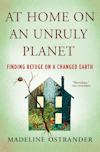

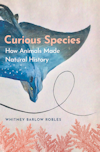
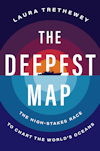

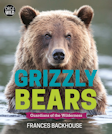
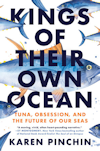
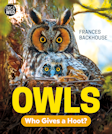
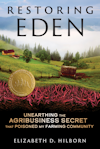
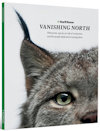
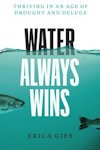







 Advertisement
Advertisement 



